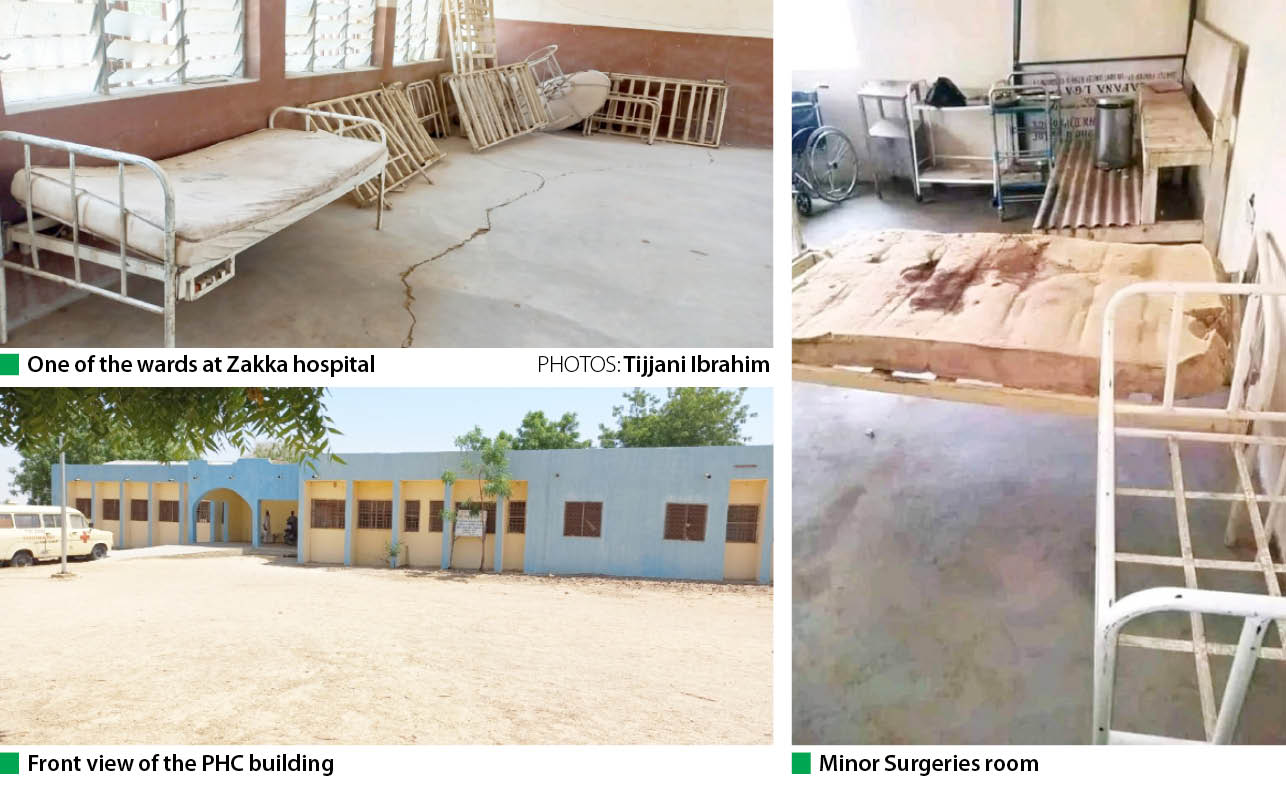Zakka is a village located 20 kilomtres west of Kurfi and 5 kilomtres off the Kurfi-Batsari Road. It is under Safana Local Government Area of Katsina State.
Both Safana and Batsari are among the frontline local government areas in Katsina that are worst hit by the activities of bandits. Kurfi had also suffered its own share of the criminality. Zakka is, therefore, in the middle of it.
BREAKING: Zamfara asks residents to take up arms against bandits
Bandits kill 5 vigilantes, hunter in Niger forest
Apart from the forest that stretches between Katsina and Zamfara states, where gunmen are said to be hibernating, the Zakka area is also close to a mountainous area where the bandits are believed to be using for their operations, which made surrounding communities to be frequented by attackers.
In addition to the population of the village, residents of many other surrounding villages have relocated to Zakka due to constant attacks by bandits. Zakka itself was not spared in the past as the village suffered several banditry attacks, but thanks to the deployment of a counterterrorism from the federal government, which constantly deters bandits’ attack on the village.
The people of the area are impoverished as bandits have taken away almost all their valuables, leaving them to wallow in poverty.
A resident of a nearby village, Muhammaed Kabir said, “If you see some cattle grazing around our villages now, you don’t need to be told that they belong to the bandits. As a result of that, we have the fear of going to cultivate our farms because in the end you will just be planting for them to feed their animals and there is nothing you can do.”
A resident Kwangwami, a neighbouring village, Malam Ali, said their village had become the bandits’ route to conduct their attacks because there was nothing left for them to steal.
Another resident, Adamu Tsagengeni, said it became very difficult for them to sleep in their village as bandits’ attacks had become a daily occurrence.
“Even if one intends to leave, his problem is where to go. We have some relatives in Bauchi State, for instance, but how can you move with your entire family? This is why we remain here and living in constant fear,” he said.
Apart from the usual attacks, the bandits also conduct stop-and-search operations along the Kurfi-Batsari road or Jibia-Batsari road.
Amidst poverty and the fear of harassment by bandits, Zakka also faces health care challenges. An average of 10,000 people from Zakka and neighboring communities access health care services at the Primary Healthcare Centre there, which is in a dilapidated condition.
This is in addition to others who come from parts of Kurfi and Batsari local government areas.
Patients come with all kinds of sicknesses for medical attention. Pregnant women also go there for either antenatal or maternity care, including deliveries. Other patients are those who sustain minor injuries due to bandits’ attacks. More serious cases are usually referred to Katsina for a more advanced medical treatment.
The village head of Zakka, Alhaji Yakubu Gawan said, “We have Zakka ‘A’ and Zakka ‘B’ wards. In Zakka ‘A’ alone, we have 17 ward heads, and under each of these you have a number of villages and hamlets. It is the same thing when you go to Zakka ‘B’, they have a number of ward heads as well as villages and hamlets under them; and all of us rely on this health facility.
“Tsabawa, Gano and Dangaru Babba, all in Batsari Local Government, attend this facility for medical care. That is why I said you could get at least 10,000 people using this primary health care facility.
“This will give you a picture of the number of beneficiaries, and that does not include those who are coming from other local government areas, such as Batsari and Kurfi.”
Historically, according to the village head, the facility began as a dispensary in 1973 and was later upgraded to a primary health care centre during the first civilian administration of Katsina State under Saidu Barda.
Despite this staggering number of beneficiaries, the health facility is in a very bad shape, especially the inner part of it. For a passerby, the assumption will be that ‘all is well’ within the health facility because the building looks fine from the periphery, but inside, it is not a pleasant scene to behold.
Daily Trust on Sunday gathered that the peripheral work was done between June and December, 2021 when the health centre received some funds from the Basic Healthcare Development Fund.
It has two fundamental issues that require urgent attention by the authorities concerned. One is the issue of infrastructure, including medical facilities, while the other is technical staff, particularly medical staff.
In terms of medical staff, the facility has no qualified doctor that is permanently stationed or even on visiting arrangement to take care of the people’s needs. In the past, medical students who were on a national service were posted to the health centre but that has stopped for quite some time, according to locals.
“Honestly, there was a doctor who was living with his family in this town during the heat of banditry and his wife had miscarriage three times as a result of gunshots. That is why they ran away, and since then, we have not had a doctor in this health facility,” a resident said.
Most of the technical staff of the hospital are also casual workers who receive a peanut amount of money for their services at the end of the month. For instance, it is pathetic to note that the woman who attends to pregnant women in labour room receives only N3,000 monthly allowance despite the hazardous and onerous task of deliveries of babies that she has to do.
The hospital also has a lab technician that conducts blood test and also blood infusion, but that also is a casual staff and the lab also require some equipment such as Packed Cell Volume (PCV) machine, blood bank and a generator to power the equipment.
In terms of working facilities and equipment, all the wards, including male, female and pediatric sections need total overhaul as the beds are without mattresses. Similarly, even though there are beds, they were far from being enough, considering the number of patients that access the facility, especially in the rainy season when you have high rate of sickness due to malaria and other diseases.
However, according to the officer in charge of the health centre, the leather coverings of the mattresses there, which were kept in a store, were worn out and will not be easy to sanitise whenever there is the need for them.
He said there was the need to purchase new coverings for the mattresses.
Also, the minor theatre room needs some equipment, at least for the treatment of minor wounds.
The officer in charge of the facility and other members of staff also need some furniture to enable them work comfortably. There is also the need for adequate toilet facilities and a functional ambulance to take care of complicated health issues that are beyond the health centre.
In his reaction, the Executive Secretary, Katsina State Primary Healthcare Agency, Dr Shamsuddeen Yahaya said, “As you know, Safana Local Government is one of the places mostly affected by this banditry. There were instances where our staff were kidnapped, and that is why, even if you send somebody there, he will live in fear. This issue of insecurity has really compounded the situation there.
“But the issue of dilapidated equipment is being taken care of by the Basic Healthcare Provision Fund. We have picked one primary health centre per ward.
“Ward development committees were formed in each ward across the state, through which the health centres will be funded so that they would execute all they need in their facilities.
“The committees and the management of each health centre will sit and conduct what we call quarterly business plan, submit to us and we assess it and disburse the funds to them to empower them to handle their problems at their own level.
“As you know, naturally, we cannot do all at the same time, so we have picked 156 out of 361 wards across the state. The rest are also in the pipeline, including that of Zakka. As we speak, the national committee has come to the state and made their assessment; and we are waiting for their approval to release the funds to those committees.”
Dr Yahaya added that as part of its restoration agenda in the area of health care, the Masari administration has come up with “Operation Rubdugu,” with the aim of providing the needed health care in the state.
He said at least 100 casual workers were engaged in each local government area by the primary health care unit, each sourced from the local communities to complement the efforts of state health care workforce, and each of them receives N10,000 a month as allowance.
He added that another 300 midwives were also engaged on ad hoc arrangement through the Midwives Service Scheme under Sure-P (MSS/Sure-P) and an allowance of N20,000 earmarked for each of them every month as they work in the maternity section and whenever there is vacancies, and all such staff are converted to permanent appointment.
Although it is difficult to access Zakka due to the security situation in the area, basic medical equipment can be transported to the facilities with the help of security agents, especially as there is the presence of a counterterrorism unit in the community.

 Join Daily Trust WhatsApp Community For Quick Access To News and Happenings Around You.
Join Daily Trust WhatsApp Community For Quick Access To News and Happenings Around You.

